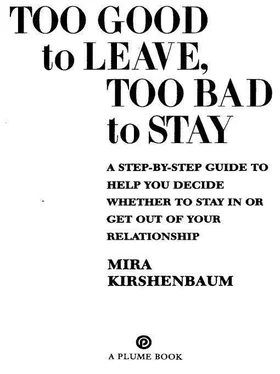Kirshenbaum, Mira - Too Good to Leave, Too Bad to Stay
Здесь есть возможность читать онлайн «Kirshenbaum, Mira - Too Good to Leave, Too Bad to Stay» весь текст электронной книги совершенно бесплатно (целиком полную версию без сокращений). В некоторых случаях можно слушать аудио, скачать через торрент в формате fb2 и присутствует краткое содержание. Жанр: Психология. Описание произведения, (предисловие) а так же отзывы посетителей доступны на портале библиотеки ЛибКат.
- Название:Too Good to Leave, Too Bad to Stay
- Автор:
- Жанр:
- Год:неизвестен
- ISBN:нет данных
- Рейтинг книги:3 / 5. Голосов: 1
-
Избранное:Добавить в избранное
- Отзывы:
-
Ваша оценка:
- 60
- 1
- 2
- 3
- 4
- 5
Too Good to Leave, Too Bad to Stay: краткое содержание, описание и аннотация
Предлагаем к чтению аннотацию, описание, краткое содержание или предисловие (зависит от того, что написал сам автор книги «Too Good to Leave, Too Bad to Stay»). Если вы не нашли необходимую информацию о книге — напишите в комментариях, мы постараемся отыскать её.
Too Good to Leave, Too Bad to Stay — читать онлайн бесплатно полную книгу (весь текст) целиком
Ниже представлен текст книги, разбитый по страницам. Система сохранения места последней прочитанной страницы, позволяет с удобством читать онлайн бесплатно книгу «Too Good to Leave, Too Bad to Stay», без необходимости каждый раз заново искать на чём Вы остановились. Поставьте закладку, и сможете в любой момент перейти на страницу, на которой закончили чтение.
Интервал:
Закладка:
There was one of those long, long, long silences I’ve learned not to interrupt. Finally Ann said in a dry, quiet voice, “I don’t think I’ve ever really liked him. I like what he likes. But I don’t like him.”
It was sad. It’s always sad for me to see a relationship breathe its last breath. But it was particularly sad here because I’d seen how hard Ann had tried to like Dave over the years. She’d done so many things with him. The Couple Who Tried Too Hard had gone on pilgrimages and retreats together. They’d taken up joint hobbies. They’d gone to every couples workshop that hit town. In a way, all that trying had worked to Ann’s disadvantage. The more she tried to like Dave, the harder it was for her to admit that she didn’t like him.
What’s the guideline for Ann and for you and for everyone in this situation?
GUIDELINE # 11
If it’s clear to you that basically and overall you just don’t like your partner, then your love is a ghost, no matter what else you have going for you and no matter how loudly your heart cries out that you love him, and you’ll be happiest if you leave. And if your partner makes it clear to you that he just doesn’t like you, then in this case, too, you’ll be happiest if you leave. Quick take: In the long run—no like, no love.
Virtually everyone I’ve encountered who was in a relationship where one person didn’t like the other was happy they left or unhappy they stayed. If you’re wondering whether you still love your partner or whether there’s enough love left in your relationship, the quick take makes the answer clear.
The “Critical Incident”
How does it get clear to people that they don’t like their partner? Sometimes you just know it. Sometimes, though, you need what I call a “critical incident” to make it clear. Before this you felt uncomfortable and maybe there were things about your partner you didn’t like, but then that one incident comes along and highlights who he really is and how you really feel about him.
For example, one woman had been on the fence for a long time about whether she liked her husband, and her dislike centered around a crass, selfish quality of his that made her think of him as a guy who was all take, no give. But she made excuses about him or pointed to other more positive qualities of his that made it hard for her to admit she didn’t like him.
Then they were at a country food fair where locals displayed free samples of homemade products they could ill-afford to give away. Her husband went up to one table and proceeded to gobble up all the pieces of cookies and cakes that had been put out as samples. The sheer, blind, gluttonous greed of this served as a critical incident that gave this woman permission to finally acknowledge that she truly did not like her husband.
If you really don’t like your partner on balance and overall, either you’ll just know it or a critical incident like this will suddenly make it clear.
A Time Trap
There’s a time trap some people fall into with this issue. They get stuck waiting for not liking to turn into liking. On one level this makes some sense. We’ve all had the experience of meeting someone, not liking them at first, getting to know them better, and then finding we like them a lot. That’s what happened to me with my husband. The first hour or so after we met, he seemed so opinionated that I didn’t like him. But then the more I learned about him, the more I liked him. There are studies to show that some of the people we like best in our lives are the people we started out not liking so much.
No wonder people who end up not liking their partners can fall into a time trap: if not liking could turn into liking before, then it can do so again, they think, and so they wait. But this is really a completely different situation. Not liking can turn into liking, but liking that turns into not liking can rarely turn back into liking. Particularly not after the kind of time and commitment you’ve given to each other.
Feeling Liked
It’s time to talk about the second part of the guideline, where it’s clear to you that your partner doesn’t like you. This is not about how your partner really feels. It’s not about whether your partner says he likes you or thinks he likes you. It is about how much liking gets through to you.
I know there’s no one in the world in a relationship who isn’t aware that there are things about them that their partner doesn’t like. But I’m talking about your having a sense that on balance and overall your partner just doesn’t like you. Day after day, waking up and going to sleep, eating or talking about the kids or watching television together, you actually feel as if with the heft of a paperweight in your hand that he doesn’t like you.
If that’s true for you, then you’ll be happiest if you leave. The bad feelings just get worse. A relationship like this is too bad to stay in.
If you’re genuinely stumped about whether you really like your partner, keep a daily record on a piece of paper. Every day jot down a D (for dislike) if basically and overall you didn’t like your partner that day. And jot down an L (for like) if something happened to make you like your partner that day.
Keep this daily record for about six weeks. Then look at what you’ve recorded. Look at the pattern of D’s and L’s. I can’t tell you what adds up for you to “basically and overall not liking your partner,” but you’ve got to let the real pattern show you the truth of your life. The truth will be there. You can do the same thing to determine whether you feel your partner likes you.
PERSPECTIVES: MUTUAL SHUTDOWN
There are many ways for a relationship to die. We’ve just talked about one: there’s no liking. But the different ways a relationship can die have something in common—what I call mutual shutdown. Let me tell you about it. You’ll find it important for understanding every guideline here and throughout the book.
Like being infected with the deadliest virus, mutual shutdown usually starts small, slow, unnoticed. It can start the day you meet, the day you marry, or not start until you’ve been together for twenty years. All it needs to get going, though, is a small hurt or disappointment. A slight coldness in bed or a sexual rebuff. The attempted hug that’s pushed away. A putdown when you’re vulnerable. Something big can start it, like discovering your partner’s had an affair. But something incredibly small can start it, too, like feeling that the present you’ve gotten for your birthday isn’t as nice as the present you gave your partner on his birthday six months earlier.
Here’s how it kills relationships. Before mutual shutdown starts, when two people come together there’s the sense that “I’ll make a hundred percent effort to contribute my full fifty percent to the relationship and you’ll make a hundred percent effort to contribute your full fifty percent. We each do our best to give our all.”
But if you do something to hurt someone or disappoint him, even if it’s unconscious and inadvertent, if you do anything to make it seem as though you’re not trying a hundred percent and not contributing fifty percent, then it’s natural that he’ll pull back, too. Maybe not right away. Maybe he’ll put up a fight. But eventually it’s going to be impossible for him to feel he wants to keep giving to you as much as he’s been giving when he sees you giving less.
What Keeps It Going?
If this were a world of saints, you’d see your partner pull back, you’d see his complaints and coldness, and immediately realize what you’d done to make that happen. You’d immediately start giving back to make him willing to give to you again. But we don’t live in that world of saints. Instead what we do is all too often respond to hurt and anger with hurt and anger of our own. If he’s going to give less, you’ll give even less than that, is in effect what we say. This mutual shutdown is a pure psychological reflex.
Читать дальшеИнтервал:
Закладка:
Похожие книги на «Too Good to Leave, Too Bad to Stay»
Представляем Вашему вниманию похожие книги на «Too Good to Leave, Too Bad to Stay» списком для выбора. Мы отобрали схожую по названию и смыслу литературу в надежде предоставить читателям больше вариантов отыскать новые, интересные, ещё непрочитанные произведения.
Обсуждение, отзывы о книге «Too Good to Leave, Too Bad to Stay» и просто собственные мнения читателей. Оставьте ваши комментарии, напишите, что Вы думаете о произведении, его смысле или главных героях. Укажите что конкретно понравилось, а что нет, и почему Вы так считаете.












